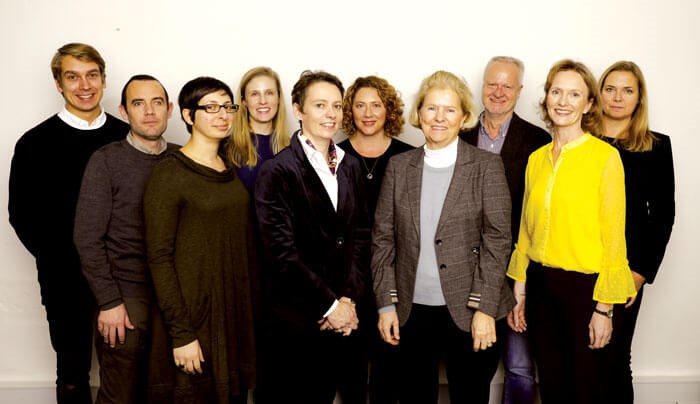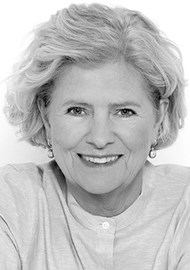The Ida Institute are a renowned organisation that develops tools, materials and resources to help hearing care professionals integrate person-centred care into clinical practice. Lise Lotte Bundesen has been at the helm of this organisation since its inception; in this article she shares what continues to drive the Ida Institute forward and the challenges of implementing person-centred care on a large scale.

Lise Lotte Bundesen with her Ida team.
In 2007, shortly after I was entrusted with setting up what was to become the Ida Institute, I attended the British Academy of Audiology’s (BAA) annual conference. I went to the presentations and looked at the exhibitions, and what struck me was that everything was about getting the most patients through the system as quickly as possible. It was all about efficiency and optimisation.
It became clear to me that what was needed was a stronger focus on the patient, not just as a pair of ears, but as a whole person. I realised then that this was where the Ida Institute could make a true difference. Thus, the notion of person-centred care (PCC) became central to the Ida Institute from the outset. When we started, this concept was still relatively new. There were some academics and dedicated practitioners around the world working to develop person-centred practices, but they were mostly working alone.
The Ida Institute was successful in bringing together many of these PCC front-runners to collaborate on the development of new, innovative methods and tools that would enable hearing care professionals to apply person-centred care in their practice. Many of the resources have become PCC textbook references, such as Ida’s Motivation Tools or Communication Partner tools, and I’m very proud of the role that the Ida Institute has played in helping introduce a number of core PCC concepts in audiology and driving the PCC agenda forward. We were also the first within the hearing care sector to use ethnography and design-thinking in our innovation processes. I believe these methods, combined with our collaborative and multidisciplinary approach, helped us forge a unique identity and attract some of the brightest minds in the world of audiology to our network. The fact that our resources are developed by those who actually use them and are based on a thorough understanding of the patient’s experience and what goes on in the appointment is one of our strengths.
Today, we have a global community of more than 14,000 hearing care professionals and the interest in the concept of person-centred care has picked up across the entire hearing care sector. This development is helped by trends in the industry and society at large. In a landscape of over-the-counter sales, remote health delivery, and changing consumer behaviours, PCC provides an opportunity for hearing care professionals to meet the patients’ expectations and strengthen their unique value proposition. At the same time, health systems around the world have recognised the importance and benefits of building care around the needs of the individual and involving patients more actively in their own care.
In effect, the big challenge today is not so much to convince the profession about the benefits of PCC, but to ensure its implementation. A recent research report published by The Economist [1] shows that while many countries around the world have included person-centred standards in their healthcare strategies and plans, the implementation of these standards is still lagging behind. The question is what can and should be done to improve the implementation of person-centred practices across systems, sectors, borders, and cultures. This is, in my opinion, the most crucial challenge moving forward with the PCC agenda.
Strengthening the implementation of PCC requires a concerted effort and the involvement of a multitude of actors – from policy-makers, to researchers and educators, to practitioners and patients. In the coming years, the Ida Institute will be working to create partnerships for PCC implementation. We have already established bilateral partnerships with a number of leading professional organisations, patient associations and universities around the world. Later this year, we are bringing all these stakeholders together in what we hope will become an international network for the development and implementation of PCC.
“I’m very proud of the role that the Ida Institute has played in helping introduce a number of core PCC concepts in audiology and driving the PCC agenda forward”
At the same time, we will work to build up a demand for PCC through the Inspired by Ida label (https://idainstitute.com/inspired). The label allows hearing care professionals who have received training and embraced person-centred methods and tools in their practice to brand themselves as person-centred, much like a mix between a Fairtrade label and Michelin Star for audiologists. The label contributes to enhancing general awareness about person-centred care while promoting clinicians dedicated to person-centred practices.
Last but not least, we will continue to involve patients, practitioners, and academics in developing new person-centred resources that meet the needs of people with hearing loss and support the implementation of person-centred practices around the world. Building on our suite of telehealth resources, Ida Telecare (https://idainstitute.com/telecare), we will help professionals deliver person-centred counselling online and explore the latest frontiers of hearing care.
To me, leadership is about having a clear vision and the courage to pursue this vision. From the outset, I put a lot of thought into the principles that should guide the work of the Ida Institute. I came to the conclusion that if we were to be successful, we needed to be independent, credible, and unique, and we needed to work collaboratively. I find that these principles, scribbled down on an old post-it that I’ve kept on my desk for 12 years, are as relevant as ever and they continue to inform every decision we make at the Ida Institute.
A lot has happened since my first encounter with the profession at the BAA conference in 2007. Today, the Ida Institute presents on PCC at major professional gatherings around the world. Our tools and online courses are widely in demand, and the BAA has become one of our trusted partners with whom we work to advance the PCC agenda. While PCC is not yet a reality in all hearing care settings, I believe we have contributed to a paradigm shift towards a more person-centred and sustainable approach to hearing care.
References
1. The Economist Intelligence Unit. Adoption of Patient-Centred Care: Findings and Methodology.
https://patientcentredcare.
eiu.com/research-report.pdf
Last accessed July 2019.






